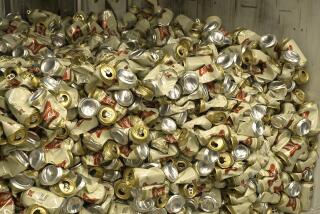Playing a Name Game With American Tastes
NEW YORK — Foreigners keep hearing Washington say America is the most open-minded market in the world. For the other side of the story, ask the importers of the Japanese “Fair Lady” sedan, “Red Kremlin” Soviet perfume and “Pschitt,” the French soft drink.
Overseas companies wooing U.S. consumers with items ranging from cars to clothes to food have discovered that their brand names sometimes are considered mushy, goofy or vulgar.
“Some companies have all kinds of problems adapting,” said Gene Milosh, president of the American Assn. of Exporters and Importers.
Japan’s Nissan, for example, renamed its Bluebird sedan the Stanza and the Fair Lady sports car the 300ZX.
“Fair Lady doesn’t evoke performance-oriented images. You could even say it’s wimpy,” said Don Spetner, spokesman for Nissan Motor Corp. USA in Los Angeles. Bluebird “has a very feminine, almost weak connotation.”
The first “Z cars” arrived in U.S. ports in the 1970s with the Fair Lady label on them, Spetner said, and the company’s American marketers quickly decided consumers wouldn’t buy the car unless the name was changed.
“They ran around peeling off the labels and replacing them with ‘240Z,’ the name of the car’s prototype,” he said.
A Soviet perfume called Red Kremlin was unsuccessful in America during the 1970s, even though it was popular at home, said Milosh. The name elicited an image of Soviet bureaucrats, he said.
Americans also would not be crazy about the French soft drink Pschitt, the Japanese coffee creamer Creap or the Finnish product to unfreeze car locks called Super Piss, said John Murphy, chairman of Interbrand-Novamark Group, a London product consulting firm.
Cultural barriers can hurt a product’s image. The French company Pernod-Ricard has faced difficulty marketing a peach-flavored champagne, Carlton Brut Peche, which has sold well at home, said Lisa Donoughe, public relations manager for the subsidiary Austin Nichols Co.
The champagne is named after a famous hotel in Cannes that the French link to movie stars and the city’s annual film festival, “but when I think of Carlton, I think of cigarettes,” she said.
Some manufacturers have learned to tone down their colors. Dahurries, Indian rugs sold in many import stores, initially were sold in their original bright colors but Americans wouldn’t buy them, said Predaap Laroia, director of the Indian Trade Development Authority. “They really took off” in America when they were produced in pastels and with geometric designs, Laroia said.
Another concern many companies have is keeping the foreign image out of the product when possible, partly because they worry about about negative reaction as a result of rising protectionism in this country.
David A. Ricks, business professor at the University of South Carolina, said he’s seen many examples of protectionist-conscious advertising, although many companies deny it.






